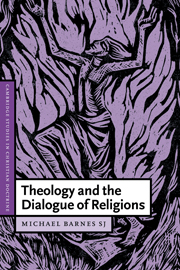5 - Telling the Christian story
Published online by Cambridge University Press: 04 December 2009
Summary
I am arguing for an account of Christian subjectivity practised before the self-revealing God in responsible relationship with persons of another faith. Such an account recognises that the subject is constantly altered in face of the ‘returning other’ and therefore raises the question with which the last chapter ended–how ‘a certain passivity’ can be considered an intrinsic dimension of Christian selfhood. The concept of the self fragmented in face of the other has, of course, become a cliché of post-modern discourse. I have therefore concentrated on the very different, yet intimately connected, ethical philosophies of Levinas and Ricoeur, philosophers with roots set deep within their respective religious traditions and sharing a common concern to engage philosophically with some of the terrible events of the twentieth century.
In Levinas, Fackenheim's ‘voice of Auschwitz’–the 614th commandment forbidding posthumous victories to Hitler–is never far away. As a Jewish philosopher concerned with an ‘ethical translation’ of the ‘Greek’ tradition, he writes in a performative mode which, I have argued, can be described as liturgical. In practice, liturgy for Levinas is the constant repetition of the Torah which, in study and learning rather than the ritual of the synagogue, calls the individual to responsibility for the Other. In philosophical terms, this translates as the maintenance of the tension between Saying and Said, the witness of Saying constantly deconstructing the ‘violence’ and ‘betrayal’ inherent in the discourse of the Said. The centrality of this concept of liturgy to Levinas's project has already been noted.
Information
- Type
- Chapter
- Information
- Theology and the Dialogue of Religions , pp. 133 - 156Publisher: Cambridge University PressPrint publication year: 2002
Accessibility standard: Unknown
Why this information is here
This section outlines the accessibility features of this content - including support for screen readers, full keyboard navigation and high-contrast display options. This may not be relevant for you.Accessibility Information
- 1
- Cited by
